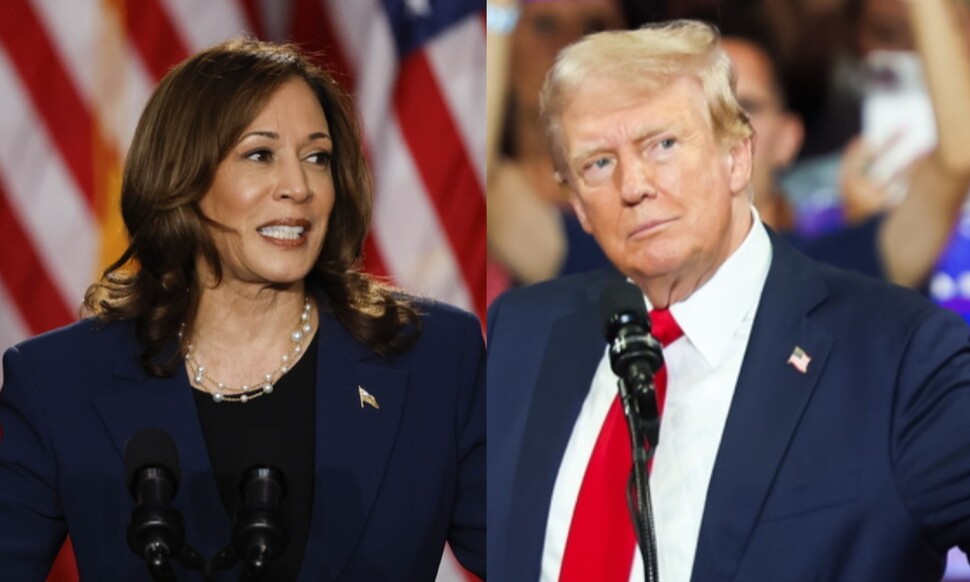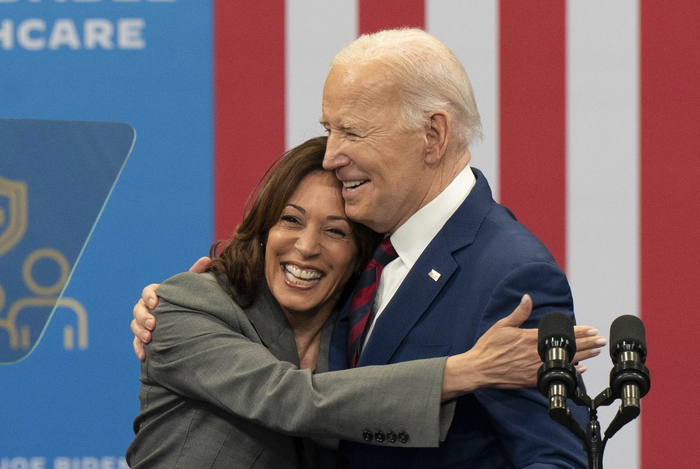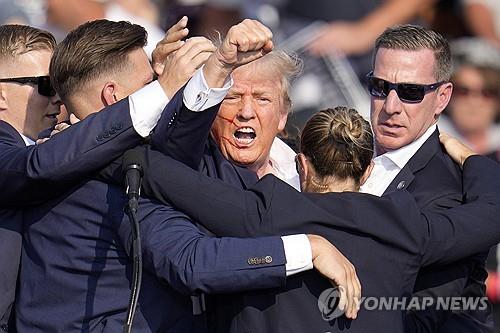트럼프-해리스의 미국 대선, 분열된 미국정치의 역설

전 세계가 주목하고 있는 2024년 미국 대통령 선거는 역설적으로 예측 가능하면서도 예측 불가능한 양상으로 진행되고 있다. 올해 미국 대통령 선거는 점점 더 양극화되어가는 미국 정치를 반영할 것이라고 전망됐다.
한쪽 진영에서는 진보적인 사회경제 정책을 옹호하고 ‘자유주의 국제질서’에서의 미국의 리더십을 지지하는 유권자들이 바이든 대통령의 재선을 지지할 것으로 예상되었다. 반면, 반대 진영에서는 전통적 사회적 가치를 수호하고 ‘아메리카 퍼스트’ 외교 정책을 지지하는 유권자들이 트럼프 전 대통령의 대선 재도전을 지지할 것으로 예상되었다.
선거 여론조사는 예상대로 양대 진영 사이에서 접전을 보여주었다. 두 캠페인은 서로를 미국에 대한 위협으로 규탄하면서 치열한 흑색선전을 주고받고 있다. 트럼프의 캠페인은 바이든 행정부가 미국의 쇠퇴를 초래하고 있다고 비난했고, 바이든 측은 트럼프의 복귀가 미국 민주주의와 법치주의에 대한 위협이라고 경고했다.
이와 함께, 몇 가지 예상치 못한 사건들이 치열한 선거 구도에서 작지만 유의미한 파장을 일으켰다. 먼저 6월 실시된 바이든과 트럼프 간의 텔레비전 토론이 민주당 내부에서 바이든의 나이에 대한 우려를 불러일으켰다. 토론에서 부각된 바이든의 노쇠한 모습이 선거에서 불리한 변수로 작용할 것이라는 우려는 당 내부에서 대선 후보 교체 여론을 확산시켰다.
이어서 7월 발생한 트럼프에 대한 암살 시도는 공화당 지지자들을 더욱 결속시키는 효과가 있었다. 같은 달 열린 공화당 전당대회에서 트럼프와 그의 러닝메이트 JD 밴스는 열광하는 지지자들에게 트럼프의 익숙한 구호 “Make America Great Again”을 약속했다. 그때만 해도 트럼프 진영이 분열된 민주당 진영보다 우위를 차지하는 듯해 보였다.
하지만 또 다른 돌발사건이 선거 판세의 반전을 이루었다. 바이든은 당내 요청을 수용하여 재선 캠페인을 중단하고 부통령 카말라 해리스를 새 후보로 지지한다고 발표했다. 8월 시카고에서 열린 민주당 전당대회에서 민주당은 해리스를 중심으로 다시 결속했다. 바이든, 빌과 힐러리 클린턴, 버락과 미셸 오바마 등 전현직 대통령과 영부인들, 민주당 지도부 및 저명인사들이 트럼프의 복귀가 가져올 위험을 경고하며 해리스의 당선 지지를 호소했다.
해리스는 후보 수락 연설에서 “새로운 길”을 공약하며, 미국이 과거로 되돌아가지 않을 것이며 오히려 더욱 진보하고 글로벌 리더십을 강화할 것이라고 선언했다. 민주당의 단합이 회복되면서 대통령 선거는 다시 접전으로 돌아갔다. 오는 11월 선거일까지 몇 가지 변수들이 트럼프 또는 해리스 캠페인에게 결정적인 동력을 제공할 수 있다.
첫 번째 변수는 대선 토론이다. 토론이 어느 후보의 호감도에 더 부정적인 영향을 미칠지는 아직 불확실하다. 바이든과 트럼프의 토론과 달리, 해리스가 트럼프보다 더 젊고 노련한 후보로서 유권자들에게 인식될 수 있다. 또한, 과거 검사 경력을 활용해 트럼프의 사법 논란을 압박하는 모습을 보일 수 있다. 반면, 트럼프는 해리스가 바이든 행정부의 정책 논란과 실책들을 책임지도록 압박할 수 있다.

두 번째 변수는 바이든 대통령의 나머지 임기 동안의 국정 지지도이다. 해리스는 대통령 후보로서 자신의 정치적 독립성을 강조할 가능성이 높지만, 그녀의 호감도는 현 바이든 행정부에 대한 대중의 지지도에 영향을 받을 것이다. 남은 선거운동 기간 바이든의 지지율이 하락하면, 해리스는 현 대통령과 거리를 두면서도 자신이 부통령으로 있는 현 행정부의 업적을 대변해야 하는 딜레마에 직면할 수 있다.
세 번째 변수는 이스라엘-하마스 전쟁이다. 단합을 강조한 민주당 전당대회에서 바이든 행정부의 친이스라엘 외교는 당내 분열이 표출한 유일한 이슈였다. 해리스는 이스라엘과 팔레스타인 지지자 모두를 만족시키기 위해 이스라엘의 안보 수호, 가자에서의 휴전 중재, 팔레스타인의 자결권 지지를 포괄적으로 공약했다. 그러나 전쟁이 지속될 경우 해리스 캠페인은 당내 단합을 유지하는데 어려움을 겪을 수 있다. 즉 친이스라엘 또는 친팔레스타인 성향 유권자들의 이탈 위험에 직면할 수 있다는 얘기다.
네 번째 변수는 어느 후보의 당선이 “변화”를 더 상징하는지에 대한 유권자들의 인식이다. 해리스 캠페인은 트럼프의 재선을, 논란이 많았던 그의 첫번째 임기로의 ‘식상한 회귀’로 묘사하며, 해리스의 당선이 새로운 세대의 리더십으로의 ‘바통 넘기기’로 홍보하고 있다. 반면, 트럼프 캠페인은 해리스의 당선을 미국 정치 엘리트의 실패한 리더십의 연속으로 규정하고, 트럼프의 복귀가 미국의 외교 및 국내 정책을 대대적으로 변화시킬 수 있는 담대한 도전이라고 홍보하고 있다. 현재 미국이 “잘못된 방향으로 가고 있다“고 생각하는 미국인이 다수라는 여론조사가 있는 가운데, 보다 더 유의미한 정치적 변화를 가져올 것이라는 기대를 받는 후보가 유권자들 사이에서 우위를 차지할 것이다.
다시 처음으로 돌아가 보면, 역설적이게도 미국 대통령 선거의 결과는 예측 가능하면서도 예측 불가능하다. 치열한 접전에서 어느 후보가 최종 당선될지는 예측이 불가능하다. 그러나 누가 당선되든, 양분된 미국의 정치지형, 특히 패배한 진영 유권자들의 적대감에 직면할 것이라는 결과는 예측 가능하다. 여기서 이런 질문을 던져본다. “차기 미국 대통령은 정치적으로 분열된 나라를 효과적으로 통치할 수 있을까?” “대통령의 권위가 국내에서도 부정 받는 상황에서 글로벌 리더십을 발휘할 수 있을까?”
과거 미국 대통령 아브라함 링컨이 경고했듯, “분열된 집은 오래 서 있기 힘들” 수 있다. 하지만 차기 트럼프 또는 해리스 행정부는 최근 미국정치에의 또 하나의 역설이 어쩌면 지속 가능하다고 증명할지도 모른다. 바로 “Divided We Stand” 미국은 극심한 분열속에서도 초강대국으로 유지될 수 있다는 역설이다.

다음은 영문이다.
2024 US President Election: The Portrait of Divided America
The 2024 U.S. presidential election campaign could be described as a paradox: both predictable and unpredictable.
Similar to recent US elections, this year’s presidential election was predicted to display increasingly polarized American politics. On one end of the spectrum, voters who favor progressive social and economic policies and support U.S. leadership within a “liberal international order” were anticipated to back President Biden’s reelection. Conversely, on the other end, voters who advocate for traditional social values and an “America First” foreign policy were expected to support former President Donald Trump’s attempt to regain the White House for a second term.
The election polls have consistently shown a close race. The two opposing campaigns have engaged in vitriolic rhetoric, each side condemning the other as posing a threat to America. Trump’s campaign has accused the Biden administration of causing America’s decline, while the Biden camp has labeled Trump’s return as a threat to American democracy and the rule of law.
The presidential race has also experienced several unexpected events, causing small yet significant shifts in the tightly contested race. In June, the televised debate between Biden and Trump sparked widespread concern within the Democratic Party regarding Biden’s age. Worried that public perception of Biden’s physical frailty might give Trump an advantage, Democrats began vocally advocating for a new candidate to replace Biden. In July, an assassination attempt on Trump galvanized Republicans to unite behind their candidate. At the Republican National Convention that same month, Trump and his running mate, JD Vance, spoke to their energized supporters with the familiar promise to “Make America Great Again.”
Then, another event caused a countervailing shift in the race. Yielding to the requests and pressures from his allies and donors, Biden announced the suspension of his reelection campaign and endorsed Vice President Kamala Harris as the new presidential candidate.
With Biden’s withdrawal, the Democratic Party rallied behind Harris. In August, at the Democratic National Convention in Chicago, President Biden, former Presidents and First Ladies Bill and Hillary Clinton, Barack and Michelle Obama, along with other prominent party figures and celebrities, warned of the dangers of Trump’s return to the presidency and urged delegates to support Harris in becoming the first African American woman president.
Harris, presenting her campaign as a “New Way Forward,” declared at the convention that America “will not go back” but will instead continue its progress and strengthen its global leadership.
With Democrats’ unity and enthusiasm mostly restored behind Harris’s campaign, the presidential race has returned to its familiar “unpredictability”—a closely contested battle where either candidate could emerge victorious. With two months left before the election, several factors may provide either Trump’s or Harris’s campaign with small but potentially crucial momentum in the final stretch of the race.
The first factor is the presidential debates scheduled for the fall. Unlike the Biden-Trump debate, Harris may succeed in presenting herself as the more youthful and articulate candidate on stage. She might also use her experience as a former prosecutor to confront Trump on his legal issues. However, Trump may be able to force Harris to defend some of Biden’s less popular policy records. Furthermore, it is unclear which candidate’s likability will suffer more from the expected exchanges of aggressive rhetoric during the debates.
The second factor is Biden’s popularity during the remainder of his presidency. While Harris will likely attempt to assert her independence as a presidential candidate, her favorability will still be affected by the public’s opinion of the current Biden administration. If Biden’s approval rating declines in the fall, Harris’s campaign might struggle to find a balance between distancing herself from the president and defending the accomplishments of the administration in which she is serving as vice president.
The third factor is the Israel-Hamas War. The Biden administration’s stance on the conflict was the one issue that exposed divisions within a party intent on projecting unity. In her speech, Harris aimed to reassure both supporters of Israel and Palestine, committing to defend Israel’s security, work toward a ceasefire in Gaza, and support Palestinian self-determination. However, if the conflict intensifies, Harris’s campaign could face greater challenges in keeping her party united, risking the loss of either pro-Israel or pro-Palestinian supporters in a closely contested presidential election.
The fourth factor is the public perception of which candidate better represents “change.” Harris’s campaign’s strategy is to portray Trump’s reelection as a predictable return to his controversial first presidential term, while Harris’s presidency will be the “passing of a baton” to a new generation of leadership. Trump’s campaign’s strategy is to depict Harris’ presidency as a continuation of the failed leadership of the political establishment, in contrast to Trump’s endeavor to reshape U.S. foreign and domestic policies. Given that polls suggest most Americans believe the country is currently on the “wrong track,” the candidate whose presidency is viewed as a more genuine change could have an advantage among the remaining undecided voters.
Returning to the paradox, the U.S. presidential election outcome will be predictable and unpredictable. It is unpredictable who will ultimately win in what is likely to be a closely contested race. However, it is predictable that the eventual winner will face a divided country, with the defeated electorate remaining adversarial toward the new president. How effectively will the next U.S. president govern a politically divided nation? Assert global leadership when the president’s authority is challenged even at home?
As former U.S. President Abraham Lincoln warned, will “the house divided against itself” eventually fall? Or perhaps the future Trump or Harris presidency might prove that yet another paradox in recent American politics is perhaps sustainable, “Divided We Stand.” That the United States can remain a superpower even amidst its internal divisions and disunity.





